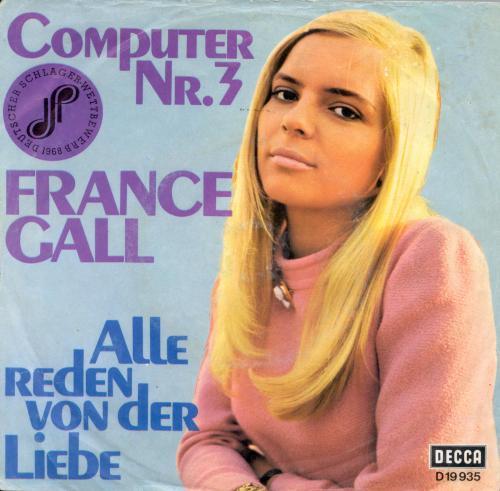Computers are personal technologies, so it comes as no surprise that we vest them with so many of our personal aspirations and desires. Take love for instance: the quest for a partner is so central to our existence, that we would do anything to make it more effective. So we turn to those technologies that, in our cultural imaginary, “connect” people. And we ask them to show us their magic. Three exemples taken from our musical mainstream can help us understand how, as the role of communication technologies has been changing over almost 50 years, the way we put trust in them to fix our love life has changed too.
- France Gall was a French teenage sensation who rose to continental stardom when she won the Eurovision contest. In this 1968 song, Computer Nr. 3 (in German), she asks an “electronic brain” to match her with the “perfect boy”. Post-WWII computers were still surrounded by this aura of scientific precision. France Gall maintains the “calculator” can be a support for her relationship, but only as far as its “logs” are in order. A very techno-deterministic take on love. Here the calculating machine oversees the relationship, framed into a bourgeois pursuit of happiness in the company of a rich and handsome husband.
Der Computer Nr. 3
sucht für mich den richtigen Boy,
und die Liebe ist garantiert für beide dabei.
Der Computer weiß genau
für jeden Mann die richtige Frau,
und das Glück fällt im Augenblick
aus seiner Kartei.
- In the 1980s, the spread of home computers and BBS familiarized millions with the idea of communication technologies. In Deeper Understanding (1989), Kate Bush sings the pangs of a lonely woman who finds love and tenderness in a computer conversation software she has “ordered from a magazine”. Eventually, she develops an addiction to her “programme” and withdraws from reality, until her family rescue her. In this case, the computer is described as a relational technology so powerful it puts “real life” relationships to shame.
As the people here grow colder
I turn to my computer
And spend my evenings with it
Like a friend.I was loading a new programme
I had ordered from a magazine:
“Are you lonely, are you lost?
This voice console is a must.”
I press Execute.“Hello, I know that you’ve been feeling tired.
I bring you love and deeper understanding.
Hello, I know that you’re unhappy.
I bring you love and deeper understanding.”
- On January 2011, The Streets premiered the concept album Computers and Blues. Among the most radio-friendly songs, the single OMG. Here the story is a bit more complicated: a boy discovers that the girl he has a crush on just changed her Facebook status to “in a relationship”. He feels betrayed, as he thought they had something going on. Then comes the surprise: she is in a relationship with him. The status update is just her way of making a declaration. Here the computer is completely embedded in everyday life. It’s not powerful anymore – no more than spoken word or a letter. And it’s not exact anymore. It can be a source of misunderstanding and ambiguity.
Looked at your status,
“In a relationship”
“In a relationship”
It devastated me.Then what did I spy, I punched the f***king sky,
Among the normally ignorable requests at the right,
I’d of never of guessed a request so nice,
Now if you look at my status,
I’m in a relationship too… with you.
